Rue Valley is a gorgeous time loop mystery, and one of the most interesting RPG prospects since Disco Elysium
Solve a temporal anomaly, and yourself.
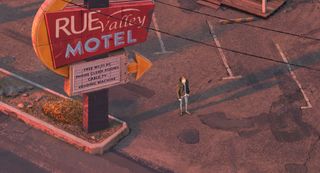
I am yet to grow tired of grabbing my sword and spell tome and setting off on some fantastical RPG adventure, but I still feel relieved when a new RPG drops and it offers something different. Rue Valley is a break from epic journeys and goblin-slaying: a contemporary RPG set around a desert motel, featuring a protagonist who's the product of their personality, not a bunch of ability scores.
Developer Emotion Spark Studio and publisher Owlcat Games—known for its massive, numbers-heavy RPGs like Pathfinder and Rogue Trader—had me right away with their pitch of Disco Elysium-meets-Groundhog Day. But playing it reveals that, for all that it shares with its inspirations, there's just as much that makes it distinct: an RPG that is very much doing its own thing.
Right away, character creation shakes things up by making me define my personality, not my skills. There are cognitive, social and emotional tracks, and my selections define how I'm able to engage with the world and its inhabitants. A calculated, introverted and indifferent character is going to have a very different approach to an impulsive, extraverted and sensitive one, naturally.
Within these tracks are traits, unlocked after you've put a number of your 10 allotted personality points into the system. If you put two points into the calculated personality, you unlock the paranoid trait, but if you'd prefer the second trait in this row, indecisive, you are free to switch them. These traits will then lock and unlock different actions and dialogue options.
Narcissist that I am, I create myself. Very impulsive, pretty extraverted, and a bit sensitive. My traits are reckless, impatient, nosy and dramatic. Yep, that's me. Sorry, I'm working on it.
Talking it out
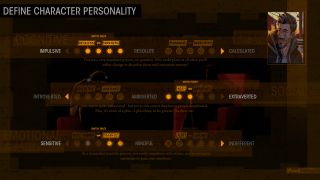
It's 8 pm and I'm in therapy. The narrator sets the scene, describing the sound of an alarm and the stale air of the motel room in which I find myself in. It's not just a therapy session, it's a therapy retreat. Like Baldur's Gate 3 and Disco Elysium, the narrator is not just a casual observer. He prods, mocks and provides insight into my mental state, simultaneously making him feel like an adversary and very close friend.
What's immediately obvious, even in this nondescript motel room, is that Rue Valley is uncommonly striking.
What's immediately obvious, even in this nondescript motel room, is that Rue Valley is uncommonly striking. It's all hand-drawn, from the extremely animated characters to the lighting and shadows. The thick, bold lines of Rue Valley's cast constantly move and flicker, calling to mind a more colourful version of the music video for A-ha's Take On Me. The stepped animation style, meanwhile, is heavily inspired by the Spider-Verse movies, turning each scene into a living comic book.
The biggest gaming news, reviews and hardware deals
Keep up to date with the most important stories and the best deals, as picked by the PC Gamer team.
This potent comic book aesthetic extends to the text boxes that accompany the voice acting—the quality of which is currently a bit inconsistent—as well as some static art that allows the game to show off scenes from more than the standard isometric perspective. The result is that conversations feel surprisingly lively, even when you're just sitting on a couch trying to avoid talking about your feelings.
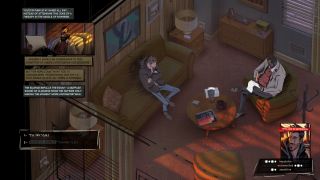
Speaking of which, my choice of traits quickly has an impact. My therapist wants me to acknowledge my "condition", whatever it is. One possible response is to shrug it off and lie about feeling fine. I can't do this, however, because pretending everything is OK isn't very dramatic. I just pick another lie. "I'll try," I tell him.
This currently enigmatic condition has cursed me with an unfortunate status effect: a total lack of motivation. This locks me out of all but the most essential interactions, so when I automatically leave the motel room at the end of my therapy session, I'm unable to strike up a chat with the woman beating the crap out of a vending machine outside. My nosy trait does allow me to hang around studying her, though.
I need to check in at reception next, but the receptionist is on the phone. Earlier, when the developer showed me a quick playthrough, they were able to get her attention and get the motel room keycard with no fuss. Because of my personality, though, I just manage to annoy her, prolonging the wait and forcing me to read leaflets and steal a pen—an epic heist only made possible thanks to my impulsiveness.
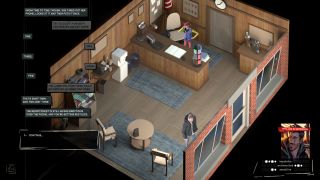
Throughout this incredibly long phone call, I keep having to find ways to pass the time. If I didn't have the impatient trait, I'd just be able to wait, but my busy brain won't let me chill. I read, play on my phone, stare out the window, make art out of smudges and get way too inside my own head. I've certainly gone through this routine in my real life plenty of times and feel far too perceived.
Eventually I get to my room, and after refusing to unpack and fiddling with my phone for a while, I fall asleep. It's while sleeping that I'm able to go through the events of the day. This menu does become accessible when you're awake, but not until later. After navigating my most recent memories, I go deeper. Vague recollections of my past, old half-remembered traumas. These memories then become connected to what Rue Valley calls an intention—its take on quests. I can commit to this intention and explore the memories more, but that requires a lot of willpower. I currently have none.
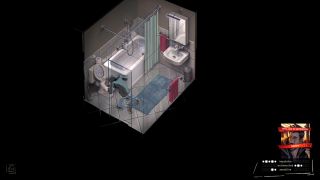
A car wakes me up, and I now have a second status effect: thirsty. I head to the bathroom, but there's a problem with the plumbing and the tap is spitting out some murky, foul-smelling water. In the developer playthrough, they smartly avoided drinking this gruesome ichor, instead going outside to hit up the vending machine. But my reckless trait forces me to throw all sense out the window and quench my thirst with poison. I throw up. I am still thirsty.
Breath no doubt stinking of puke, I finally head to the vending machine. The car that woke me up smashes into a transformer and then peels off, but that's a mystery for another day. I'm too parched to care. I gulp down an entire bottle of water, and then, unexpectedly, I get to witness the end of the world. I don't even have time to enjoy my thirst being quenched before the sky turns red—an apocalyptic anomaly instilling me with dread. How do I stop it? The narrator gives me a simple answer: I stop being me. And the loop begins again. It's 8 pm and my therapist is trying to get my attention.
Do-over
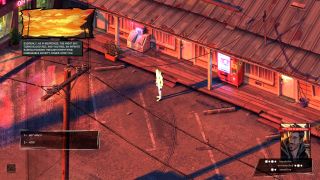
If you've watched the seminal Groundhog Day, or one of the many movies or TV episodes it's inspired (I thoroughly recommend the excellent Stargate SG-1 episode Window of Opportunity) then you'll know the deal here. You're stuck in a single day—in this case, a single 47-minute portion of the day—forced to relive it over and over again, but you get to keep the skills and knowledge you learn in each loop. And just like Groundhog Day, you escape the loop by working on yourself.
Rue Valley immediately breaks the threat of constant repetition by changing how the therapy session plays out. As well as still lacking motivation, I'm now stuck with another status effect: anxious apprehension. It makes me more calculated and sensitive, but also ladens me with "deep inner turmoil". I'm shaking. I just got booted back in time, so that's a pretty normal response. I fail the emotional check and just start sobbing. This inspires my shrink to give me a herbal remedy, a purple pill, to help me sleep.
There are a lot of opportunities to alter traits and push the personality tracks in different directions. Splashing water on my face calms me down, and taking a glug of whisky from a bottle I find makes me more extraverted. The loop structure gives you a chance to experiment, see the results, and then either repeat or avoid the action on the next run. I really wanted to see what taking the purple pill with the whisky would do, but because I'd just calmed myself with the water, I temporarily lost the reckless trait, stopping me from risking my health.
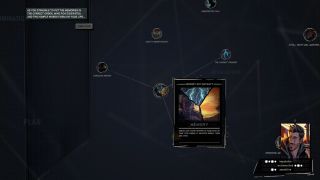
Day 2 goes by pretty quickly. Being tipsy inspires me to flirt with the receptionist, cutting out all the waiting around I did before. The pill, meanwhile, conks me out right after I get into my room. I've got new memories now. Everything that happened after the car woke me up the previous night gets added to the menu, spawning a new intention. I need to work through it to figure out whether or not this is all real or if it's a fantasy. The pill has helped. I lose my status effects (apart from tipsy) and gain one point of motivation, which I'm able to use to commit to this intention.
I'm a sucker for time loops, but Rue Valley is compelling beyond its primary conceit.
So I now have a purpose. I go outside and find evidence that the car has come and gone, leaving shards on the ground next to the transformer. And then the sky turns red. I confirm the time, 8:47 pm, and accept my fate. It's 8 pm again. I'm in therapy. Again. But I'm making progress—now I know it wasn't just a fantasy. With this intention complete, I realise I'm stuck in a time loop. And now that I'm not lacking in motivation or filled with anxiety, I can start to unravel the mystery. Unfortunately, this is where the demo ends.
I'm a sucker for time loops, but Rue Valley is compelling beyond its primary conceit. Unlike most RPGs and adventure games, it wants you to solve people—not epic quests or tricky conundrums. You'll need to figure yourself out, as well as the people staying at the motel and the denizens of the desert beyond it.
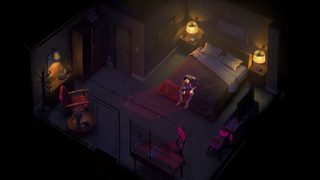
Initially everyone is a stranger, even yourself, and your thoughts are largely negative. Your therapist is a hack, the woman by the vending machine is nuts, the receptionist thinks you're a weirdo. You're wrapped up in your preconceived notions and self-esteem issues. But each run through the loop is an opportunity to analyse yourself and learn empathy.
Rue Valley also kinda codifies how a lot of people already play RPGs, gaming the system by using save scumming to land on the best outcomes. Here, though, you don't need to bend the rules—instead you have infinite opportunities to do or say the right thing, and you get to keep the satisfaction that comes from figuring it out yourself. At the same time, you're still a product of your personality traits, so different traits will conjure up a different experience. Even in this short slice, there are a lot of places where events can subtly diverge depending on both the choices you made at character creation and the ones you make in the moment.
I'm actually frustrated that I can't play any further. Especially now that I can actually interact with people. And that road out of the motel beckons. What will I find in the desert? I've played through twice now and might jump back in for round three, even though its big mysteries will remain locked. That's really the best result for a demo: making you ravenous for the full thing.

Fraser is the UK online editor and has actually met The Internet in person. With over a decade of experience, he's been around the block a few times, serving as a freelancer, news editor and prolific reviewer. Strategy games have been a 30-year-long obsession, from tiny RTSs to sprawling political sims, and he never turns down the chance to rave about Total War or Crusader Kings. He's also been known to set up shop in the latest MMO and likes to wind down with an endlessly deep, systemic RPG. These days, when he's not editing, he can usually be found writing features that are 1,000 words too long or talking about his dog.
Most Popular

